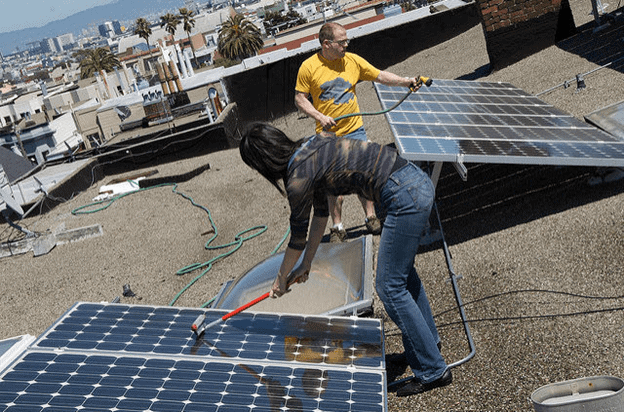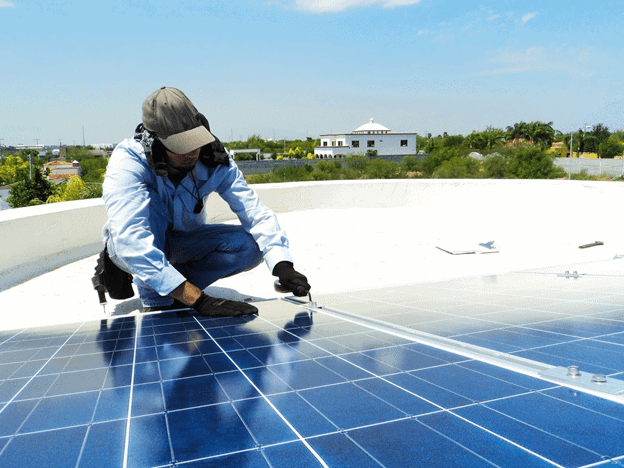Solar panels do not require high maintenance because they generally have self-cleaning mechanisms. In most cases, especially residential panels, people pay no attention to them. Rainfall shall do the deed. Makes sense!
However, in locations that are dry or when panels are tilted, they may often cover up with dust or bird droppings. In places where there is light, misty rain or no rain and constant drought conditions – you might need to get up there and clean the solar panels.
These substances can build up over time and affect the electricity generated by a solar module. The dirt can affect how much sunlight gets through. Indeed the amount of lowered efficiency is tiny, just 5% or even lower. It equals to a 20 dollar loss in your energy bill if you are using the typical 5kW solar panel.
Freshening up your solar panels is a good idea if you reside in an area with heavy particulates in the air. In this article, we address some questions on how to clean them, what materials to use and how often should you get the hassle of cleaning.
Once you have decided that cleaning needs to take place, surf through your options: Are you able to do it on your own? Would you rather hire a professional?

Solar companies provide cleaning services. As part of their job description, you can call Scoop Solar if you live in an area that’s highly prone to grit, dust, and droppings. If you choose to do it on your own, get soap, a hose, water supply and voila! There you go!
What should I use to clean the panels?
For starters, ask your installer about particular considerations, if any. Handling the glass with care is the first instruction any expert would give you. Scratching or damaging the panel will result in a reduction of panel energy. Do it the same way you wash your car. Slow and meticulous!
The ideal way to clean a solar panel is with dish soap mixed with warm water and applied with a soft sponge. That would be safe and easy. Another option could be to use a good quality soft brush and cloth covered sponge on another side.
Precautions to take
Follow the instructions provided by your solar panel manufacturer and then proceed to the task.
Make a note that you should not use a high-pressure water spray. It can also damage the panels as water gets in between the cells. Also, do not use the laundry detergents. They may react with the panels and bring a negative outcome.
You should know that solar panels are extremely hot on a heated summer day. Apart from giving you sunburns, cleaning on a hot day would result in quick evaporation of soapy water. It ultimately leaves the smudgy surface behind, affecting the efficiency of these panels.
When reaching out for the pitched roof, use the fall protection gear.
How often should I clean my Solar Panels?
It is the most commonly asked question. Consumers are often confused whether they are doing a good job in maintaining the panels. Too much cleaning can result in the scratched surface, and scarce clean-up activity can disrupt the overall efficiency of the panels.
To figure out the frequency of cleaning, you should consider the following factors:
- Your location
- The amount of wind and dust blowing
- The tilt angle of your panels
- Electric rate
- Costs occurred when cleaning the panels
Location factors include the amount of dirt and droppings. The dust category should be understood. Easy dirt gets removed swiftly by rain or a simple water wash.
Stubborn dirt, on the other hand, is hard to move. As for the tilt angle, steep angles are hard to wash from the rooftop. Cleaning them from the ground is however easier.
Monitor functions
Feel free to tidy up the panels out there on a cool, cloudy morning. If you live in a location where rainfall barely happens, you should do that more often say, on a monthly basis.
Monitor your solar panel’s function by closely analyzing the electric bills. Find out the cause of fluctuation if you identify any. It is integral to control the numbers, so you reap the optimum benefits out of your investment.
The fluctuation will let you know if it needs maintenance or cleaning. Check the efficiency after rainfall. Does bill reduce it? If yes, problem solved. If not, make a call to the professionals. Expert insight into the condition of your solar cells will then assist you to make your next move.
The modern integration into the cells was that of anti-clinging film. It resists debris and dust is easier to blow off.
Solar panels are one-time investments that tend to bring you prolonged benefits. Choose the cleaning option that fits you best, whether you do it on your own or call a professional.
Author Bio
Andrea Bell is a blogger by choice. She loves to discover the world around her. She likes to share her discoveries, experiences and express herself through her blogs.
Find her on Twitter:@IM_AndreaBell.








